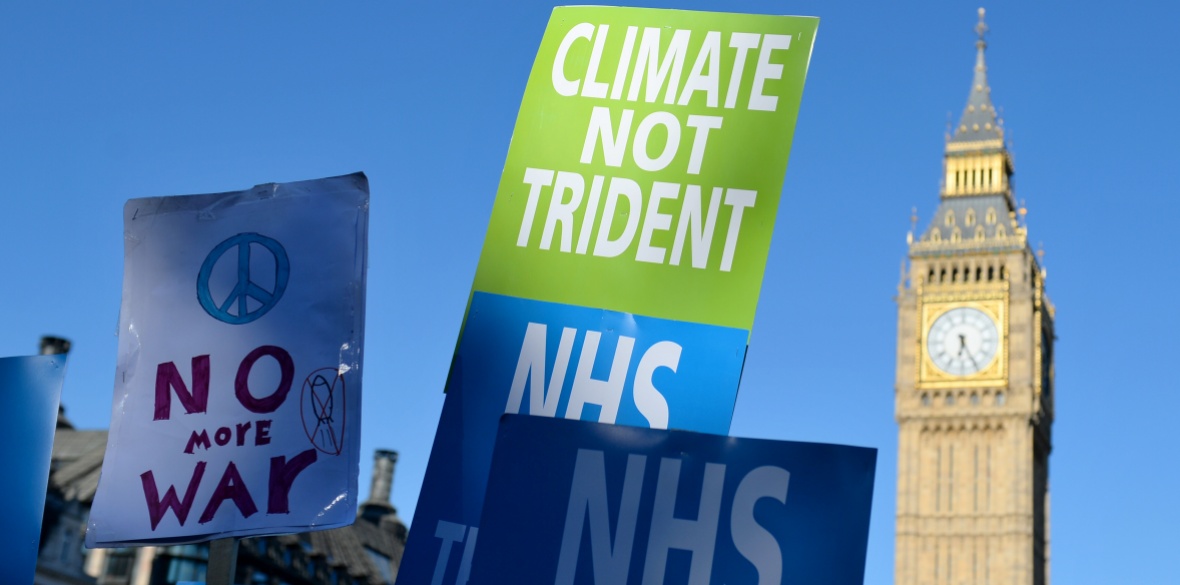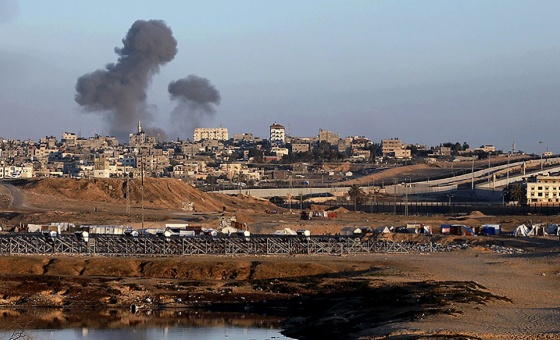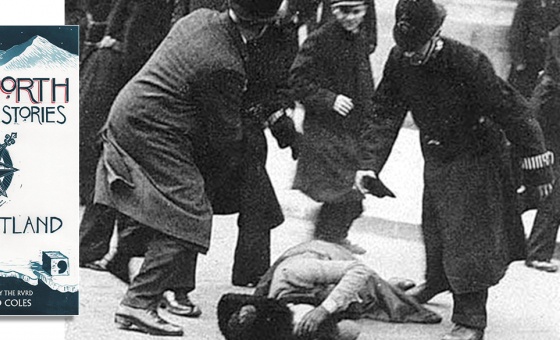This is the last article you can read this month
You can read more article this month
You can read more articles this month
Sorry your limit is up for this month
Reset on:
Please help support the Morning Star by subscribing here
PEACE protests at nuclear weapons sites and military bases could be at risk under a new national security law currently making its way through Parliament, campaigners have warned.
Military bases and nuclear weapons establishments - which are designated as prohibited places under espionage laws — have long been a target of anti-war and anti-nuclear protests.
But campaigners now fear that protests at these sites could be repressed under measures contained in the National Security Bill.
The Campaign against Nuclear Disarmament (CND) said the Bill was of “great concern” to the group.
General secretary Kate Hudson said protest activity at military and nuclear sites has formed a “strong strand” of CND’s 70-year campaign calling for the abolition of nuclear weapons, including protest and peace camps.
“Further restrictions could actually prevent people going to the bases or doing blockades, none of which are a danger to national security,” she said.
“[Protesters] are raising awareness of the issue, and giving people an opportunity to say we don’t want weapons of mass destruction.
“The Bill, when the Home Secretary talks about it, is designed to prevent threats from hostile foreign entities. CND protesters and our allies across the peace movement do not in any sense come into that category.”
The security Bill seeks to create two new offences relating to entering prohibited sites and activity around them.
It replaces a section in the Official Secrets Act, which already makes it a crime to enter a prohibited place with a “purpose prejudicial to the safety or interests of the state.”
Under the changes, this offence would cover a broader range of activity including a person accessing, entering, inspecting, passing over or under, approaching or even being in the vicinity of a prohibited place — or using a drone to do this.
Those convicted of the offence could face a maximum jail sentence of 14 years, a fine or both — up from two years under existing legislation.
The Home Office claims the new measures are needed to update legislation in line with cyber developments that have allowed “hostile actors” to use new methods of entering, accessing or inspecting sensitive sites, such as drones.
But Netpol argues that the provisions are designed “to specifically prevent and suppress protest,” and that police do not need more powers.
“This is yet another attack by this government on our right to protest,” Netpol communications co-ordinator Emily Apple told the Star.
A new power allowing officers to order people to leave prohibited sites or a place adjacent to them could “potentially have a massive impact” on peace and protest camps, she warned.
“We have a long and proud history of protest action at military bases — from the Aldermaston marches in the 1950s and 1960s, to Greenham Common, and actions against the 2003 Iraq war at Fairford.
“It is essential that people have the right to protest at these sites and highlight our nuclear capacity and challenge illegal and immoral wars.”
“Anyone who cares about our right to protest should be worried about the powers contained in this Bill.”
Ms Hudson said that existing legislation has largely struck the right balance between allowing democratic protest at military bases while protecting the sites.
“Now the balance is going to be shifted massively in the direction against the right to protest,” she warned.
Peace Pledge Union campaign manager Symon Hill said he feared the Bill could make anti-war protests at military bases “effectively illegal.”
“The armed forces are already treated as if they were above the law,” he said. “If this Bill is passed it will place them even further beyond scrutiny.
“Military leaders will be able to carry on planning their wars without even the sound of people protesting outside.
"As Netpol rightly point out, this bill extends laws that already restrict peaceful protests at military sites. The term 'prejudicial to the UK' is a common euphemism for anything that threatens the military establishment.”
A Home Office spokesperson said: “Peaceful protest is a vital part of a democratic society. It is a long-standing tradition in this country that people are free to gather together and to demonstrate their views, provided that they do so within the law.
“Through the National Security Bill, we are undertaking the biggest overhaul of legislation for a generation to tackle the evolving threat of hostile activity by states.
“Prohibited places provisions already exist in law, our reformed provisions are not designed to impede legitimate protest but strengthen protection of vulnerable sites. There are also safeguards to protect legitimate activity and to restrict the use of police powers to target harmful activity.”

 Bethany Rielly
Bethany Rielly









